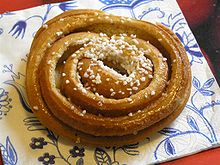
Summary
Nib sugar (also pearl sugar and hail sugar) is a product of refined white sugar. The sugar is very coarse, hard, opaque white, and does not melt at temperatures typically used for baking. The product usually is made by crushing blocks of white sugar, then sifting to obtain fragments of a given diameter. The sugar may also be made in an extrusion process.


It is known as pärlsocker (pearl sugar) in Sweden, and as perlesukker in Denmark and Norway. In Finland, it is called raesokeri ("hailstone sugar") or rarely helmisokeri (also pearl sugar).
In Sweden, pärlsocker is used extensively to decorate various pastries and confections, cookies, especially on top of plain Swedish bulle or Finnish pulla,[1] cakes, muffins[2] and buns, such as kanelbullar (cinnamon buns) and chokladbollar.
In Germany, it is known as Hagelzucker and traditionally used on Christmas cookies and cinnamon buns.
In Belgium, it is used in Liège waffles, while in Friesland, it is used in sûkerbôle[3] (sugar bread).
In France, it is often used on chouquettes.
References edit
- ^ "Mrs. Claus' Cookbook - Swedish Pepparkakor". www.northpole.com. Retrieved 2021-02-04.
- ^ "Goda bananmuffins med pärlsocker". archive.vn. 2012-08-01. Archived from the original on 2012-08-01. Retrieved 2021-02-04.
- ^ "Sûkerbôlle / Suikerbrood – Frisian Sugar Bread". applepiepatispate.com. Archived from the original on 2011-07-07.
External links edit
- Media related to Nib sugar at Wikimedia Commons


